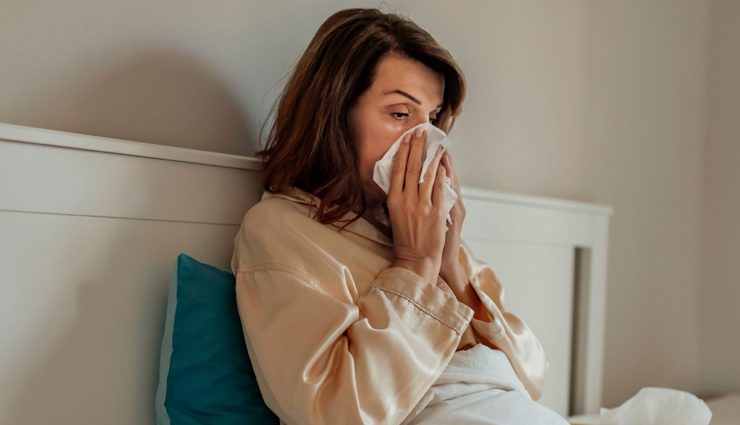- Home›
- Healthy Living›
- 7 Simple And Healthy Ways To Improve Your Immune System
7 Simple And Healthy Ways To Improve Your Immune System
By: Shikha Mon, 13 Feb 2023 10:17:01

There are plenty of supplements and products claiming to help boost immunity. But supporting a healthy immune system is more complicated than taking a mix of vitamins and minerals packaged into a pill or powder.
Your immune system operates in a very delicate balance. It must be strong and sophisticated enough to fight off a variety of illnesses and infections, but not so strong that it overreacts unnecessarily.
To achieve this, it's very tightly controlled by many inputs and in response to what's happening inside of your body.
Like we said, complex.
From fighting off a cold to the flu to COVID-19, there are things you can do to help give your immune system what it needs to function optimally, though. None of which involve taking a supplement.

Stay up-to-date on recommended vaccines
Vaccinations throughout childhood are essential to protect young lives. Vaccines help provide immunity to children before they are exposed to potentially harmful diseases like hepatitis B, measles, mumps, polio and more. All vaccines are extensively tested and approved for use by the CDC.
Vaccines help your immune system fight infections faster and more effectively. When you get a vaccine, it sparks your immune response, helping your body fight off and remember the germ so it can attack it if the germ ever invades again.

Maintain a Healthy diet
Since your immune system requires a healthy balance of real foods, these nutrients should be a top priority for your everyday eating pattern:
PROTEIN – Protein is the building block of immune cells. A diet lacking in protein can seriously hamper your immune function. Most adults need at least 50 grams of quality protein per day, or a palm-sized portion per meal if that’s easier to visualize. Make an eating pattern out of incorporating quality protein for each meal, like eggs for breakfast, turkey chili for lunch, and crab cakes for dinner. Or try a handful of roasted pumpkin seeds!
ANTIOXIDANTS – Make sure your meals have COLOR. As a rule of thumb, the more colorful foods are, the healthier they are – unless you’re eating a bag of Skittles. Deep rich colors indicate micronutrients and antioxidants, which your body needs for protection and recovery from illness. Studies have shown that antioxidants improve immune responses, so throw some purple cabbage, red bell pepper, and green beans in your grocery cart, will ya?! And when you get home, cook them up with lots of herbs or yellow turmeric for an extra flavor boost.
When you emphasize protein and colorful foods in your diet, chances are you will get plenty of micronutrients needed for proper immune function, like vitamins A, B6, E, and C, and Zinc. And the more veggies you eat, the more you might start to like (and crave!) them.
Finding balance between life and food can be tough, so start small. Implement one new food challenge each week and build up from there. For example, in week 1 you could start eating breakfast at home, in week 2 you could eat protein at breakfast, in week 3 add 1 cup of vegetables to your dinner meal, and then keep it going from there.

Exercise regularly
Exercise makes your immune system function better. It helps your body respond to viruses more quickly and optimally. Physical activity also makes your body react efficiently to vaccines. This means that you can develop a stronger antibody response, which will better protect you.
Not only does exercise get the immune cells moving throughout the body during activity, but it also promotes a lasting presence of these immune cells for up to three hours after exercise is completed. This provides extra time for the immune cells to identify unwanted intruders and keep you from getting sick.

Get plenty of sleep
Sleep provides essential support to the immune system. Getting sufficient hours of high-quality sleep enables a well-balanced immune defense that features strong innate and adaptive immunity, efficient response to vaccines, and less severe allergic reactions.
When we sleep, our bodies produce a protein called cytokines, which target infection and inflammation, creating an immune response. Our bodies also produce T-cells during sleep, which are white blood cells that play a critical role in our body's immune response to an infectious disease such as COVID-19.

Stay hydrated
Having enough water throughout each day is essential to maintaining good health and immunity. Increasing your water intake can help flush out toxins, ward off illness and help us reset your system. Aim for 8-10 glasses of water daily - and remember, by the time thirst hits, we are already dehydrated.
Water is a key component of lymphatic fluid. The lymphatic fluid contains specialized white blood cells, called lymphocytes, that help the body fight infection. As the lymphatic fluid circulates, it helps remove waste products, toxins, and impurities from your body – including bacteria and viruses.

Minimize stress
Stress can reduce the number of natural killer cells or lymphocytes in the body, which are needed to fight viruses, according to the American Psychological Association.
Chronic levels of increased stress hormones can increase your body's inflammatory response. When inflammation is on-going, it can wear down the immune system and make it less effective overall. Stress also interrupts other functions that boost your immune system.

One last word on supplements
"Eating healthy foods that contain micronutrients is always better than taking a supplement.”
Though supplements are better than nothing for a person with a known nutrient deficiency, when natural food is not enough.
If you’re worried you may have a nutrient deficiency, it’s best to consult with your doctor before taking a supplement. Unlike medications, supplements aren't regulated or approved by the FDA.





